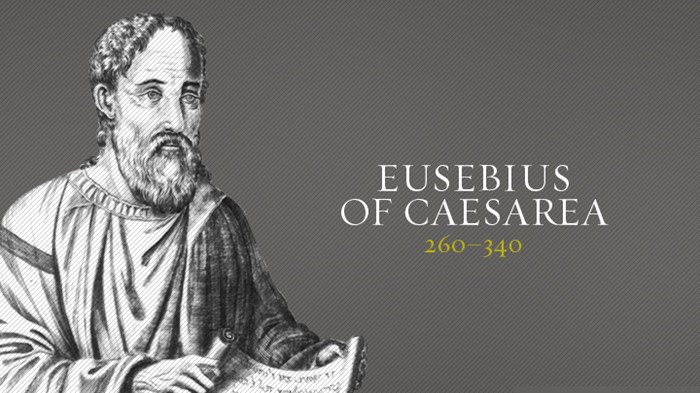
"I feel inadequate to do [church history] justice as the first to venture on such an undertaking, a traveler on a lonely and untrodden path."
Imagine writing a comprehensive history of the church's last three centuries. Now imagine no one has ever written such a history before, so there's no single collection of key documents, no books profiling key figures, no chronology of major events, not even a fixed system of dates. When Eusebius, bishop of Caesarea, undertook such an effort, he felt trepidation: "I feel inadequate to do it justice as the first to venture on such an undertaking, a traveler on a lonely and untrodden path," he wrote in his introduction to the The Church History (or Ecclesiastical History). "But I pray that God may guide me and the power of the Lord assist me, for I have not found even the footprints of any predecessors on this path, only traces in which some have left various accounts of the times in which they lived."
For this ten-volume work, Eusebius is known as "the father of church history." But in his day, he was as much a maker of history as a recorder of it.
Persecuted
There was once a biography of Eusebius, written by his successor as Caesarea's bishop, but like so many other documents, it is lost. So we know nothing for certain about this historian's early life. He was probably born in Palestine, certainly baptized at Caesarea and ordained a presbyter (elder) under his teacher and friend, Pamphilus. So closely did he follow this Origen devotee that he called himself Eusebius Pamphili, son of Pamphilus.
But in 303 came Diocletian who ordered his "great persecution," and Pamphilus was martyred within seven years. Eusebius too, was imprisoned but managed to avoid his mentor's fate. Around 313, about the time of Constantine's Edict of Milan, Eusebius became bishop of the Palestinian city. There he continued work on his church history, which he began during the persecutions. He also wrote a 15-volume refutation of paganism called Preparation, and Demonstration of the Gospel, demonstrating Christ's fulfillment of Old Testament prophecy; he also completed his Chronicle of world history.
Timeline |
|
|
215 |
Origen begins writing |
|
230 |
Earliest known public churches built |
|
250 |
Decius orders empire-wide persecution |
|
260 |
Eusebius of Caesarea born |
|
340 |
Eusebius of Caesarea dies |
|
367 |
Athanasius's letter defines New Testament canon |
Eusebius's history was not written simply to record the deeds of the church after Christ's ascension; he wanted to show that Christianity, with Constantine's conversion, was the pinnacle of humanity's long climb. The church had been an oppressed minority, but now it could enter a period of peace.
Peace seeker
Just as Eusebius was writing about Christianity's defeat of paganism, one of its greatest threats was developing on the inside. Arius, a presbyter from Libya, was gaining followers around the empire, teaching, "There was a time when the Son was not." Egyptian bishop Alexander and his chief deacon, Athanasius, fumed at the teaching. The argument spread throughout the empire, promising to rip the church in two. Constantine—God's chosen instrument, as Eusebius saw him—called the Council of Nicea to close the fissure.
Since his earliest days with Pamphilus, Eusebius was enthralled with the teachings of Origen, who has been criticized for 1,800 years for his belief that the Trinity was a hierarchy, not an equality. So Eusebius was less concerned with Arius's heresy than the threat of disunity in the church. When Arius was censured, Eusebius—who thought the entire debate brought Christianity the "most shameful ridicule"—was among the first to ask that he be reinstated.
At the Council of Nicea, Eusebius (whose name means "faithful") attempted to mediate between the Arians and the orthodox. But when the council was over and Arius was anathematized, Eusebius was reluctant to agree with its decision. He eventually signed the document the council produced, saying, "Peace is the object which we set before us." But a few years later, when the tables flipped and Arianism became popular, Eusebius criticized Athanasius, hero of the council. He even sat on the council that deposed him. Eusebius wasn't himself an Arian—he rejected the idea that "there was a time when the Son was not" and that Christ was created out of nothing. He simply opposed anti-Arianism.
As the Arian controversy continued to rage, Eusebius stayed in Caesarea—declining a promotion to become bishop of Antioch—and wrote. Among his most famous writings of this period was another history: a praise-filled Life of Constantine, his adored political leader.

Support Our Work
Subscribe to CT for less than $4.25/month


























